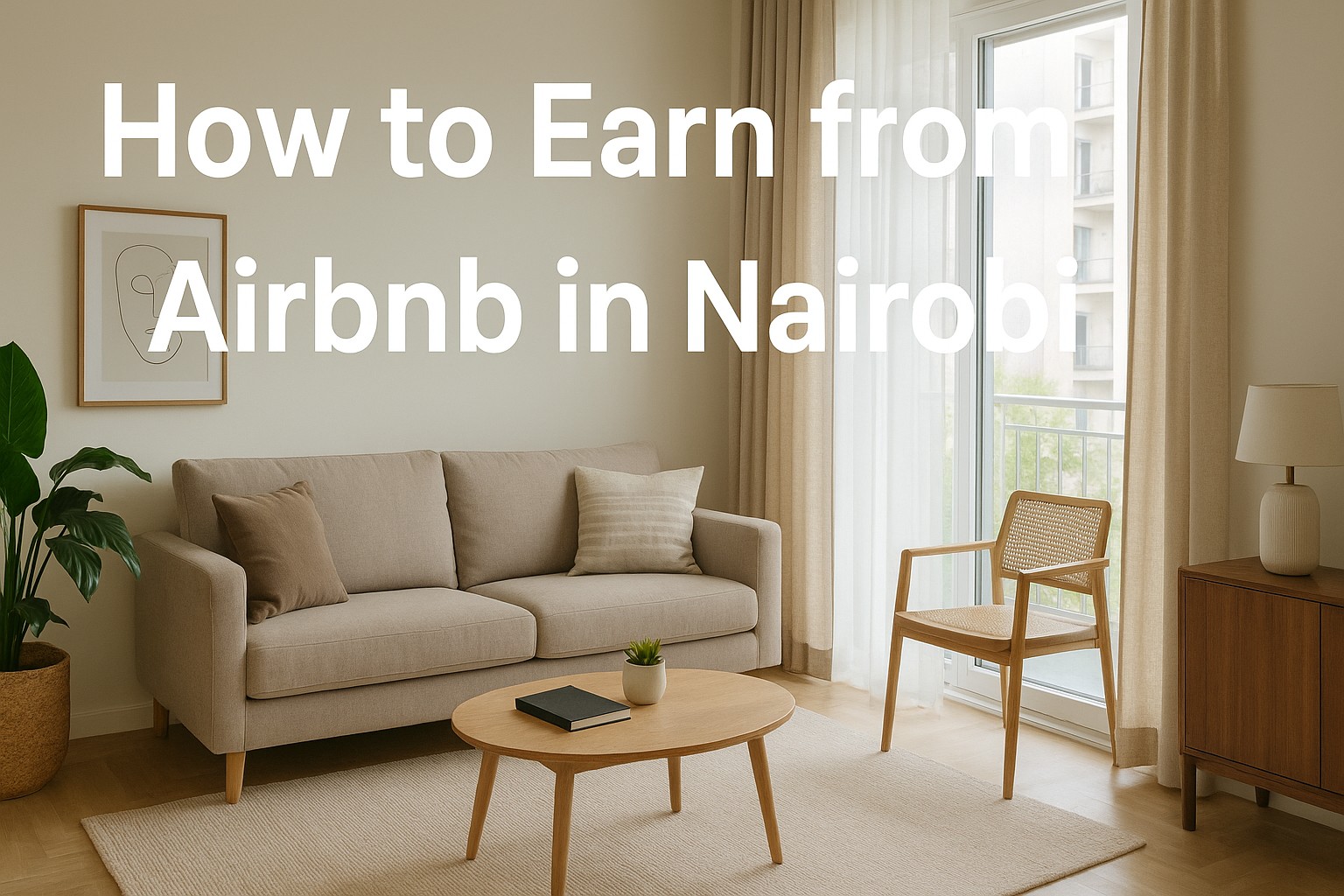

Titus Morebu
Author
How to Earn from Airbnb in Nairobi: A Practical Guide 🏡
Turn your property into income: learn how to start, optimize, and scale Airbnb in Nairobi—legal setup, pricing, operations & growth strategies.
Why Airbnb in Nairobi Can Be Profitable
Nairobi offers a compelling market for Airbnb and short-term rentals. With tens of thousands of travelers—business visitors, expatriates, tourists—demand for flexible, homely accommodation is strong. The average Nairobi Airbnb listing generates around USD 624 per month, though many listings underperform depending on location, amenities, and management. (Recent data shows occupancy rates around 33–46% and average daily rates of USD 43–55 in 2025.)
But success isn’t guaranteed. Making money with Airbnb in Nairobi requires smart strategy, valid legal setup, and consistent management. Below is a roadmap you can rely on.
Step 1: Do Your Market Research 📊
- Pick the right neighborhood: Areas like Westlands, Kilimani, Parklands, Lavington, Lang’ata, Karen, and CBD generally see more bookings due to proximity to business districts, shopping malls, and tourist sites.
- Check comparable listings: Study existing Airbnb listings in your area. Note pricing, amenities, guest reviews, photos, and occupancy trends. This gives you a benchmark for your own competitive offering.
- Demand seasonality: In Nairobi, demand peaks in December, July, August. Plan for slower months by adjusting rates or offering discounts.
- Guest personas: Nairobi guests include business travelers, digital nomads, families, and domestic travelers. Tailor your property features and marketing to these segments.
Step 2: Legal & Regulatory Setup ✅
Operating legally is crucial to avoid fines or shutdowns. In Kenya, Airbnb and short-term rentals are regulated. Make sure you:
Register & License with TRA
Short-term rentals are treated as commercial accommodation under the Tourism Act. You must register with the Tourism Regulatory Authority (TRA) and obtain an annual license. Operators are required to register short-term accommodation rentals—including Airbnb—with TRA, as per new enforcement directives. Effective immediately, all operators of short-term accommodation rentals, including Airbnbs, are required to register with TRA.
Annual license fees depend on property type. For instance, serviced flats, villas, holiday cottages often attract license fees around KES 26,000 per unit. An initial application fee (e.g. KES 1,000) may also apply. The licensing process also requires safety inspections and proof of compliance with health, safety, and building standards.
Business & Local Permits
- Register a business via eCitizen or Business Registration Service (as sole proprietor, partnership, or limited company).
- Obtain a Single Business Permit from your county government—this grants you the right to operate locally.
- Ensure zoning compliance—some residential zones may not legally allow commercial hospitality use.
Tax Compliance
Income from short stays is taxable in Kenya. The rules include:
- If your rental income is between KES 288,000 and KES 15 million per year, you may be subject to the Monthly Residential Rental Income Tax (MRRIT), which is 7.5% of gross rent (as per the Finance Act 2023). Below or above that range, general income tax rules may apply.
- You must file returns with Kenya Revenue Authority (KRA), keep records of income and expenses, and remit any required VAT if your turnover crosses the threshold for VAT registration.
- Some hosts may also need to pay 2% of gross receipts toward TRA for services related to accommodation.
Step 3: Prepare & Furnish Your Property for Bookings 🎯
Your property must deliver comfort, reliability, and “wow” appeal to guests, which helps earn positive reviews and repeat bookings. Focus on:
Essential Amenities & Features
- High-speed, reliable Wi-Fi—nonnegotiable for most travelers.
- Comfortable beds, quality bedding, blackout curtains.
- Air conditioning or fans depending on property climate.
- Fully equipped kitchen (if self-catering) or basic refreshments.
- Secure parking, 24/7 security or gated entry if possible.
- Backup power—solar or generator—to avoid outages.
- Good lighting, functional appliances, clean bathrooms.
- Touches like a small welcome basket, toiletries, guidebook for local attractions.
Interior Styling, Photography & Listing Design
Invest in professional photos. Bright, high-resolution images showing every room and highlighting unique features significantly increase your booking rates.
Write an SEO-optimized listing title and description including location + main selling points (e.g. “Spacious 2BR in Kilimani near malls”). Use key amenities as bullet points in description to improve search visibility inside Airbnb.
Step 4: Pricing, Availability & Revenue Strategy 💰
Dynamic Pricing Strategy
- Set base price comparable to nearby listings.
- Raise prices during high-demand periods; lower them during slower seasons.
- Offer discounts for weekly or monthly stays.
- Use Airbnb’s smart pricing tools or third-party yield management software.
Availability & Minimum Stay Settings
Many Nairobi hosts set 1-night minimum to boost flexibility. But during peak season, you can enforce a 2–3 night minimum. In low-demand times, offer last-minute discounts or longer stays to fill gaps.
Occupancy Optimization
- Allow flexible check-in/check-out where possible to attract more bookings.
- Keep calendars up to date to avoid double bookings.
- Promptly respond to inquiries to maintain high response rate (which affects Airbnb ranking).
Step 5: Guest Experience & Operations Excellence 🧹
Guest Communication & Responsiveness
- Provide clear check-in instructions and digital welcome manual.
- Respond fast—even messages within minutes help your reputation.
- Offer local tips: restaurants, shopping, transportation, safety guidance.
Cleaning, Maintenance & Quality Control
- Hire reliable cleaners who ensure cleanliness, restocking, and proper turnover.
- Do routine inspections and maintenance checks to prevent breakdowns (plumbing, appliances, electrical).
- Use checklists to ensure consistency across stays (linens, toiletries, supplies).
Security & Safety Measures
- Install cameras in common entrances (while respecting guest privacy inside rooms).
- Provide smoke detectors, fire extinguishers, first-aid kit, emergency contacts.
- Record guest IDs on arrival (check-in compliance) to enhance safety and peace of mind.
Step 6: Scale, Optimize & Diversify 🎯
Consider Co-Hosting & Property Management
If you don’t want to manage day-to-day operations, you can become a co-host or hire a full-service management company. Co-hosts usually take 10–30% of booking revenue in exchange for handling guest care, cleaning, listing optimization, and property oversight.
Expand Your Portfolio
- Once you master one property, replicate in nearby neighborhoods.
- Use profits to acquire additional units, or partner with property owners under revenue-sharing.
Add Upsells & Services
Offer extras like airport pick-up, guided tours, grocery pre-stocking, laundry, or local experiences. These services can boost revenue per guest.
List on Multiple Platforms
Don’t rely solely on Airbnb—also list on Booking.com, Expedia, or local hospitality platforms to expand your reach and reduce dependency.
Step 7: Monitor Metrics & Continuously Improve 📈
Track key performance metrics every month:
- Occupancy rate
- Average Daily Rate (ADR)
- Revenue per Available Night (RevPAR)
- Operating expenses (cleaning, utilities, repairs)
- Net profit margin
- Guest rating trends / review feedback
Use guest feedback (especially constructive criticism) to improve: upgrade features, adjust listing copy, refine guest messaging, or address delivery issues.
Common Challenges & How to Mitigate Them
- Income volatility: Off-peak seasons may see low demand. Mitigate by targeting long-stay guests or offering discounted rates.
- High maintenance & operational costs: Frequent turnovers, repairs, utilities. Build in buffer budgets and preventive maintenance plans.
- Regulatory changes & uncertainty: Keep abreast of county and national rules; engage in local host associations.
- Competition & saturation: Differentiate via unique decor, excellent service, or thematic experiences.
- Guest damage & disputes: Use security deposits, screening, house rules, and solid guest policies.
- Community complaints: Enforce visitor rules, limit noise, provide clear check-in instructions to reduce disturbances in residential zones.
Putting It All Together: Sample Earnings & Projections
Assume you have a 2-bedroom apartment in Kilimani:
- Nightly rate: USD 60 (≈ KES 8,400)
- Occupancy: 50% (≈ 15 nights/month)
- Gross monthly income: 15 × 8,400 = KES 126,000
- Expenses (cleaning, utilities, management, repairs): ~20% → KES 25,200
- Net revenue ≈ KES 100,800
If you scale to 3 units in a similar setting, your passive income can grow significantly, with economies of scale in procurement, cleaning, and management.
Conclusion & Next Actions
Earning money with Airbnb in Nairobi is very achievable—but only with strategic preparation, legal compliance, guest-focus, and continuous iteration. Follow the steps above to set up properly, deliver great experiences, and grow your business over time.
Ready to begin? Start by choosing your property, doing neighborhood research, then move on to licensing and listing. Let your property start paying for itself—and build a scalable short-term rental empire in Nairobi! 🔑
Gallery

Related Articles
3 articles
How TitoCreations Empowers Kenyan Entrepreneurs With Smart Business Systems
Discover how TitoCreations equips Kenyan entrepreneurs with profitable business ideas and modern software systems to start, manage, and scale successful ventures.

How to Start Poultry Farming in Kenya 2026: A Complete Step-by-Step Guide to Profit
Learn how to start and run a profitable poultry farm in Kenya in 2026 with up-to-date setup, costs, management, marketing, and profit strategies.

Freelancing in Kenya: How to Start With No Experience 2026
Learn how to start freelancing in Kenya with zero experience, build marketable skills, find clients, and earn KES or dollars online in 2026.